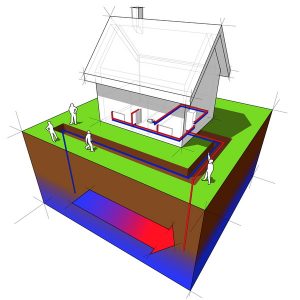 At this point, a lot of homeowners have discovered the benefits of using a heat pump. However, most homeowners will associate heat pump technology with the air-source heat pump, a system that closely resembles a traditional split central air conditioner in many ways. Now, air-source heat pumps are great—but they are not the only systems that allow you to cool and efficiently heat your home through the implementation of the heat transfer process. A geothermal system allows you to do so, as well.
At this point, a lot of homeowners have discovered the benefits of using a heat pump. However, most homeowners will associate heat pump technology with the air-source heat pump, a system that closely resembles a traditional split central air conditioner in many ways. Now, air-source heat pumps are great—but they are not the only systems that allow you to cool and efficiently heat your home through the implementation of the heat transfer process. A geothermal system allows you to do so, as well.
If you are unfamiliar with geothermal heating and cooling, then today’s post is for you! We offer outstanding geothermal services in Columbia, SC. The installation of these systems is uniquely complex, and you really need to be working with professional geothermal technicians if you hope to get the best and most reliable performance possible from your geothermal system. So read on, learn about how such systems operate, and reach out to our geothermal pros with any questions that you may have.
Exchange Heat with the Ground
In an air-source heat pump, refrigerant evaporates in the indoor evaporator coil to remove heat from the air in the house when it is in cooling mode. The flow of the refrigerant and the function of the coils is reversed in order to heat the home, with refrigerant evaporating in the outdoor coil in order to draw heat out of the air. Then, the refrigerant is compressed and its thermal energy is used to heat the home.
In certain conditions, the air-source heat pump may lose some efficiency when it struggles to draw a sufficient amount of heat out of very cold air. The major benefit of using a geothermal heat pump, as opposed to an air-source model, is that temperatures in the ground are much more constant than those of the air.
How It Works
A geothermal loop system is installed on your property, and a heat transfer fluid is circulated throughout this loop system. There are different ways in which to install a loop system, depending upon your property. They may be installed horizontally or vertically, directly in the ground or even underwater. In pond loops, an open or closed system may be utilized.
The process is the same regardless, however. When cooling the house, the heat pump removes heat from the air in the home. The heat is transferred from the refrigerant to the solution in the geothermal loop. That heat is released into the ground (or water). In the winter, heat is drawn out of the ground (or water) by the antifreeze solution, and that heat is exchanged with refrigerant in the heat pump. The heat pump compresses the refrigerant, and it is condensed in the house in order to release its heat therein.
Benefits of Geothermal Systems
Like any heat pump, the big benefits of geothermal heating and cooling are that you need just one home comfort system, and the heating is very efficient. However, geothermal systems have an added bonus thanks to the constant temperature in the ground. Not only is there more consistent heat to draw from in the winter, but the ground is also cooler than the air in the summer. That makes it easier for the system to release heat, boosting both performance quality and efficiency even further!
Schedule your geothermal services with Fulmer Heating & Cooling.





